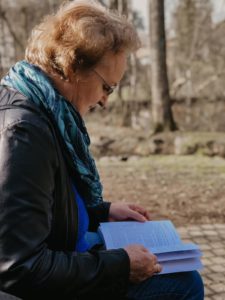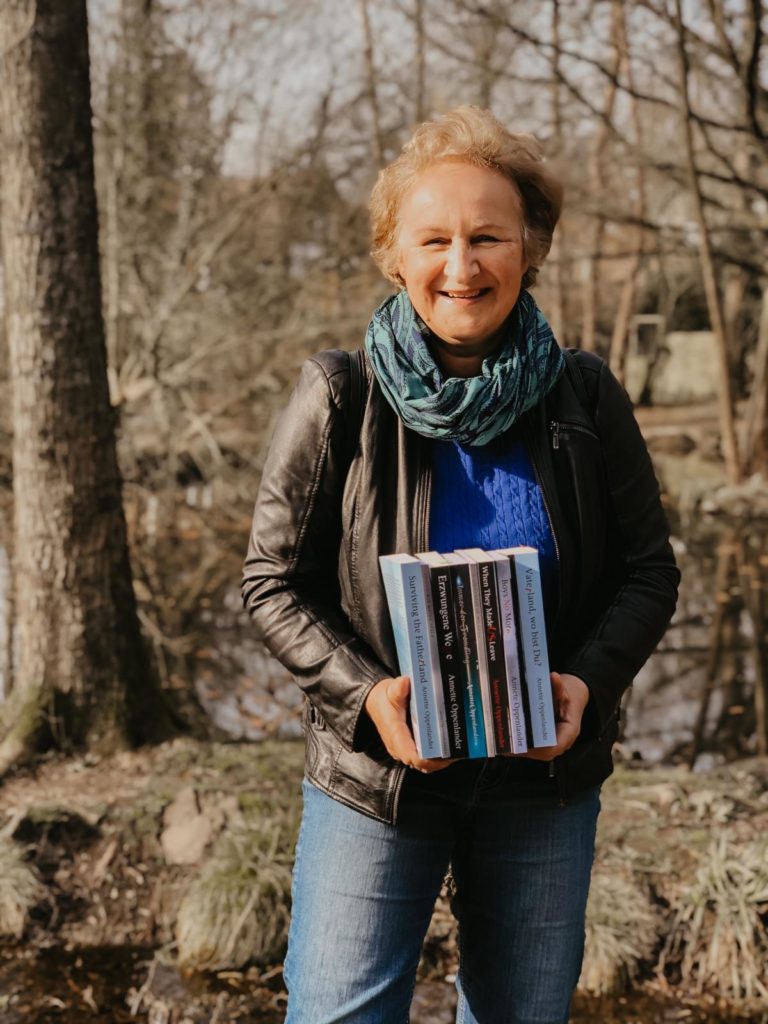 Last week I showed my amazing daughter-in-law, Mar, some of the historical spots of my WWII novel Surviving the Fatherland. She also helps me with marketing on Instagram and Facebook. It so happens that we live a five-minute walk from the places, my parents and main protagonists endured the war.
Last week I showed my amazing daughter-in-law, Mar, some of the historical spots of my WWII novel Surviving the Fatherland. She also helps me with marketing on Instagram and Facebook. It so happens that we live a five-minute walk from the places, my parents and main protagonists endured the war.
We stopped by the old bunker where Lilly hid from Allied bombs and Günter discovered his claustrophobia. The building now has large windows – it was used as housing for immigrants for a while – but has lost none of its severity. It is a constant and important reminder of Germany’s horrific past.
We also walked past my father’s and mother’s childhood homes. The beech tree that provided shelter and strength to Lilly in the novel still stands. Now, more than 75 years later, it is a protected tree, a natural monument, rising an easy hundred feet into the sky.
 We ended our walk at the well where Lilly and Günter picked up water after the terrible weekend bombing on November 4/5, 1944. The water still runs strong though it just flows into the pond now. The little park next to it served as backdrop to several scenes with Lilly. Mar and I took photos and let the atmosphere speak to us: Sometimes, I feel as if I can hear voices, old voices, whispers, I see women and children stand in line with buckets, see their frightened faces. It is a magical place, a bit scary yet equally fascinating. I read a few lines of Surviving the Fatherland, letting the words spill into the air, feeling them gain strength and come alive.
We ended our walk at the well where Lilly and Günter picked up water after the terrible weekend bombing on November 4/5, 1944. The water still runs strong though it just flows into the pond now. The little park next to it served as backdrop to several scenes with Lilly. Mar and I took photos and let the atmosphere speak to us: Sometimes, I feel as if I can hear voices, old voices, whispers, I see women and children stand in line with buckets, see their frightened faces. It is a magical place, a bit scary yet equally fascinating. I read a few lines of Surviving the Fatherland, letting the words spill into the air, feeling them gain strength and come alive.
It was a powerful afternoon reliving some of my family’s memories and sharing them with Mar.
WWII Stories Are Relevant Today
 Since I began digging into WWII history, particularly the experience of civilian Germans and war children, I’ve independently published several novels and novellas, both in English and German. My next project will be a novel about the 14 million displaced Germans who lived in Eastern Prussia, Silesia, and other Eastern regions at the end of WWII. When Germany lost the war, these areas were assimilated by Poland and the Sowjetunion. People left with nothing but their suitcases to be resettled father west. Many died on the way. The rest initially expected to return to their homes. That never happened…
Since I began digging into WWII history, particularly the experience of civilian Germans and war children, I’ve independently published several novels and novellas, both in English and German. My next project will be a novel about the 14 million displaced Germans who lived in Eastern Prussia, Silesia, and other Eastern regions at the end of WWII. When Germany lost the war, these areas were assimilated by Poland and the Sowjetunion. People left with nothing but their suitcases to be resettled father west. Many died on the way. The rest initially expected to return to their homes. That never happened…
The loss of home and everything that defines a person in a place is a powerful theme. It is no less important today when millions of people are displaced because of political unrest, civil war, dictatorships and genocide.
- Novellas: 47 Days, A Lightness in my Soul, Boys No More (Collection)
- Novels: Surviving the Fatherland, When They Made Us Leave

